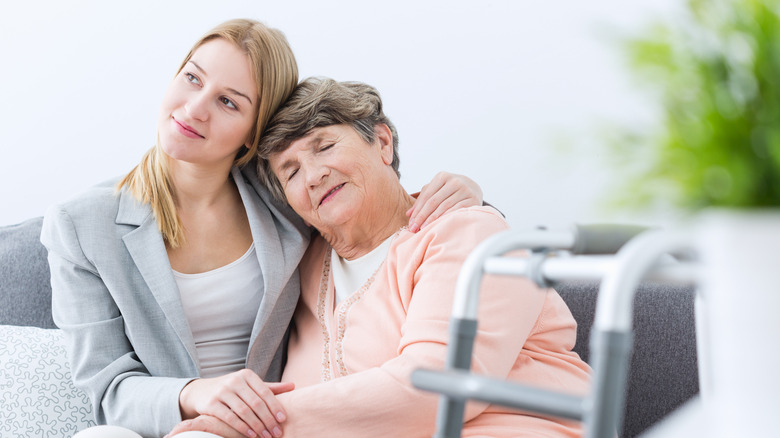How To Deal With The Stress Of Being A Caregiver
At some stage in your life, you have probably acted as a caregiver to a family member. According to Johns Hopkins Medicine, "a caregiver is a person who tends to the needs or concerns of a person with short- or long-term limitations due to illness, injury or disability." Since many of the tasks such as helping with shopping, organizing medications, transporting or accompanying loved ones to doctors visits, and so on, just seem like the natural and "normal" things to do amongst families, most caregivers do not tend to self-identify as caregivers. But nevertheless, caregiving, whether consciously or unconsciously done, can lead to significant burnout.
Caregiving can range anywhere from caring for a newborn infant to supporting and providing care for a terminally ill parent, grandparent, or spouse, with so many other variations in between. Often times when your loved ones are in pain or ill, all you want to do is make them feel better, any way possible. In the short term. things may be okay and stable for both parties, but as time goes on and conditions deteriorate or circumstances worsen, caregivers may start neglecting their own basic needs, in order to support their loved ones. Managing your own life, while simultaneously that of a sick or disabled loved one, while rewarding, is taxing on everyone.
Ariana Golchin, a psychiatric certified physician assistant and mental health activist, spoke exclusively to Health Digest, stating, "Everyone copes and processes emotional distress differently. Each individual's threshold for what they can tolerate and how they manage and work through it is going to look a little different." The key factor, she says, is knowing when a person should be concerned, by identifying the warning signs.
What are the warning signs of caregiver stress or burnout
It is estimated that one in three Americans, who aren't paid healthcare workers, will act as a caregiver to other adults in their lifetime (via MayoClinic). As the adult population ages, this statistic may very well increase. In addition, 60 percent of caregivers also work outside of the home. Feeling overwhelmed and incredibly stressed is common amongst caregivers: That is why it is important to identify the warning signs of caregiver stress and burnout.
PA Golchin recommends being aware if any of the following symptoms are present in the caregiver; are they no longer physically taking care of themselves like getting enough sleep or eating properly, are they no longer showing up for important obligations or previous responsibilities, are they passively or actively exhibiting suicidal thoughts, is there abuse of alcohol or drugs present or are they engaging in risky behavior as a means to cope, and/or are they not allowing oneself to be with their own thoughts and needing a continuous distraction. Any one of these symptoms is cause for further investigation.
How you can address caregiver burnout
Once warning signs have been identified, it's important to seek proper help or treatment. Seeking help can be contentious for caregivers who may battle between taking time for themselves and doing more for their loved ones. However, it's important to remember that if you don't care for yourself, you will not be able to care for anyone else.
Golchin spoke further to Health Digest, stating, "The prevalence of poor self-care and neglecting one's needs is very common. There is often a strong sense of guilt associated with taking time for ourselves because others are relying on us during their most difficult and vulnerable times." This is especially true, she notes, amongst healthcare workers. "Society has programmed us to strive for excellence on repeat, even if that means compromising our own physical and emotional wellbeing. We reach a point where we may believe we are taking care of ourselves and implementing self-care practices, when in reality we are barely meeting basic needs that help us function and stay alive."
Asking for help is a great first step in combatting caregiver burnout. The Mayo Clinic recommends having a list of tasks you need help with ready and be willing to let others help you. Sharing tasks can help you feel less overwhelmed. It can also open up more time for you to take care of yourself, ensuring you keep up with your own regularly-scheduled medical visits and more. Setting realistic goals and expectations of yourself is also important. Goals which are overly ambitious are less likely to be accomplished, which can lead to worsening burnout and unwarranted feelings of inadequacy. Another great resource for caregivers is joining a caregiver support group.
Consider joining a caregiver support group
Thankfully there are numerous caregiver support groups which are typically comprised of caregivers and can be either generalized or specific to the diseases or conditions you are caring for (via Verywell Health). These groups meet regularly, and according to Golchin, "can provide an overwhelming sense of community and remind caregivers that they are not battling alone" She goes on to say, "Having others to support and encourage you during your most vulnerable and challenging times can make a very large and positive impact."
If you're interested in joining a support group but don't know how or where to start, make a call to your primary care provider or your loved one's medical team. For example, if you are caring for someone with cancer, reaching out to the cancer facility where they are receiving medical treatment will likely connect you to a relevant support group.
Consider speaking with a therapist
If speaking or interacting in a support group setting is not your style, consider speaking one-on-one with a licensed therapist or healthcare provider. Golchin recommends therapy during all phases of life, as opposed to solely during difficult or overwhelming times. Therapy "can also be very useful to begin implementing coping skills in addition to other mindfulness or meditation exercises." Developing and honing these skills in peaceful seasons of life can help you deal with more stressful seasons more easily.
If therapy or support groups aren't providing you with adequate relief of symptoms and stress, then it may be time to talk about adjunctive medication. Golchin emphasizes the "importance of taking care and prioritizing one's physical health due to the strong correlation it has with mental health."
It's also important to remember that asking for help does not mean you "failed" in any way. Caregivers can receive additional support by hiring part-time home health aides to help with tasks; utilize adult care centers and programs for their loved ones for a few hours a week; or even consider short term nursing stays if they needed (via Mayo Clinic).
Caregiving can be an extremely rewarding experience and even strengthen familial relationships. However it is important to acknowledge the hardships it may bring and address them accordingly. And always remember, you are not in this alone.





